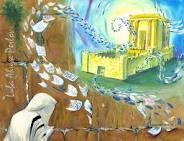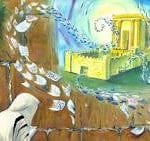We are beset with a leadership caught between a desire to what they know they should be doing and the exile mentality and fear of “what will the world say”. As I sat visiting the tent of the hunger strikers in Jerusalem trying passionately to convince the government to change their intention to destroy the Jewish homes in Bet-el. It was difficult to overcome the feeling of Déjà vu and frustration. It was maddening to think of how many hunger strikes, demonstrations, marches and petitions we have endured. Yet the words in the Torah portion of BeHaalotcha were comforting.
In the book of Shmot , we learn that the people of Israel were meant to observe the Passover “When you come into the land that G-d shall give to you” (Exodus 12:25). Since the first Passover in Egypt and throughout their sojourn through the wilderness the Passover was not celebrated .Yet in the Torah portion of BeHaalotcha we read on an exception;
” HaShem spoke to Moshe in the Sinai Desert, in the second year of their exodus from the land of Egypt, in the first month, saying: The children of Israel shall make the Passover sacrifice in its appointed time. ( Numbers 9:1-2)
Yet at this time a group of Jews found themselves in a difficult situation
There were men who were ritually unclean [because of contact with] a dead person, and therefore could not make the Passover sacrifice on that day. So they approached Moshe and Aaron on that day. Those men said to him, “We are ritually unclean [because of contact] with a dead person; [but] why should we be excluded so as not to bring the offering of HaShem in its appointed time, with all the children of Israel ( ibid 6-7)
There very bold declaration produced Divine results;
HaShem spoke to Moshe saying: Speak to the children of Israel saying, Any person who becomes unclean from [contact with] the dead, or is on a distant journey, whether among you or in future generations, he shall make a Passover sacrifice for HaShem. In the second month, on the fourteenth day, in the afternoon, they shall make it; they shall eat it with unleavened cakes and bitter herbs. ( ibid 9-11)
Their dramatic and courageous declaration of yearning “but why should we be excluded” revealed new Torah into the world.
Similarly in the beginning of the Torah portion we read regarding the laws of Aaron’s lighting of the menorah.
Rashi asks regarding the words in the text “When you light”: Why is the portion dealing with the menorah juxtaposed to the portion dealing with the chieftains? For when Aaron saw the dedication [offerings] of the chieftains, he felt distressed over not joining them in this dedication-neither he nor his tribe. So G-d said to him, “By your life, yours is greater than theirs, for you will light and prepare the lamps.” – [Tanchuma Beha’alothecha 3]
The same truth is revealed later in the book of Numbers with the daughters of Tzlofchad
And the daughters of Tzelofchad …stood before Moshe, .., saying: Give us a portion among our father’s brothers.” (Numbers 27:1-4).
G-d immediately responds “Rightly do the daughters of Tzelofchad speak. You shall surely give them a possession of inheritance among their father’s brothers, and you shall transfer their father’s inheritance to them” (ibid: 7).
The implication here again is the distress and yearning of mortals prompted newly revealed heavenly direction.
Yet Rashi asks another question in the beginning of the Torah portion;
“The events related in this chapter occurred in the first month of that year, while the events of the first chapters of this book (Numbers) occurred in the second month. This teaches us that the Torah does not necessarily follow in chronological order. Why, indeed, does not the Book of Numbers open with this chapter? Because it is a disgrace for Israel. For in the forty years that the Jewish people were in the desert, this was the only Passover offering they brought.”
On this the Lubavitcher Rebbe Z”tzl asks an important question.” why would the fact that the people did not celebrate Passover in the wilderness be a “disgrace”. It is clear that HaShem had already declared that the Passover should be celebrated “”When you come into the land that G-d shall give to you” (Exodus 12:25). Yet the lesson of the second Passover and the daughters of Tzlafchad taught the people of the power of yearning. The real “disgrace” was that they did not continue to yearn in the wilderness. It is that same “disgraceful “ lack of yearning for redemption that is keeping us shackled to exile in our days.
We do not know when all of our prayers, strivings, demonstrations, and hunger strikes will make a difference. Yet, if nothing else, it is a consistent and ever present cry of yearning. Yearning never remains orphaned as all is recorded in the heavens “You have counted my wanderings; and have placed my tears in Your flask. Are they not all inscribed in Your book”( psalm 56:9)
May we be granted the strength and courage to continue to strive and yearn and may we taste of its fruit speedily in our days.

